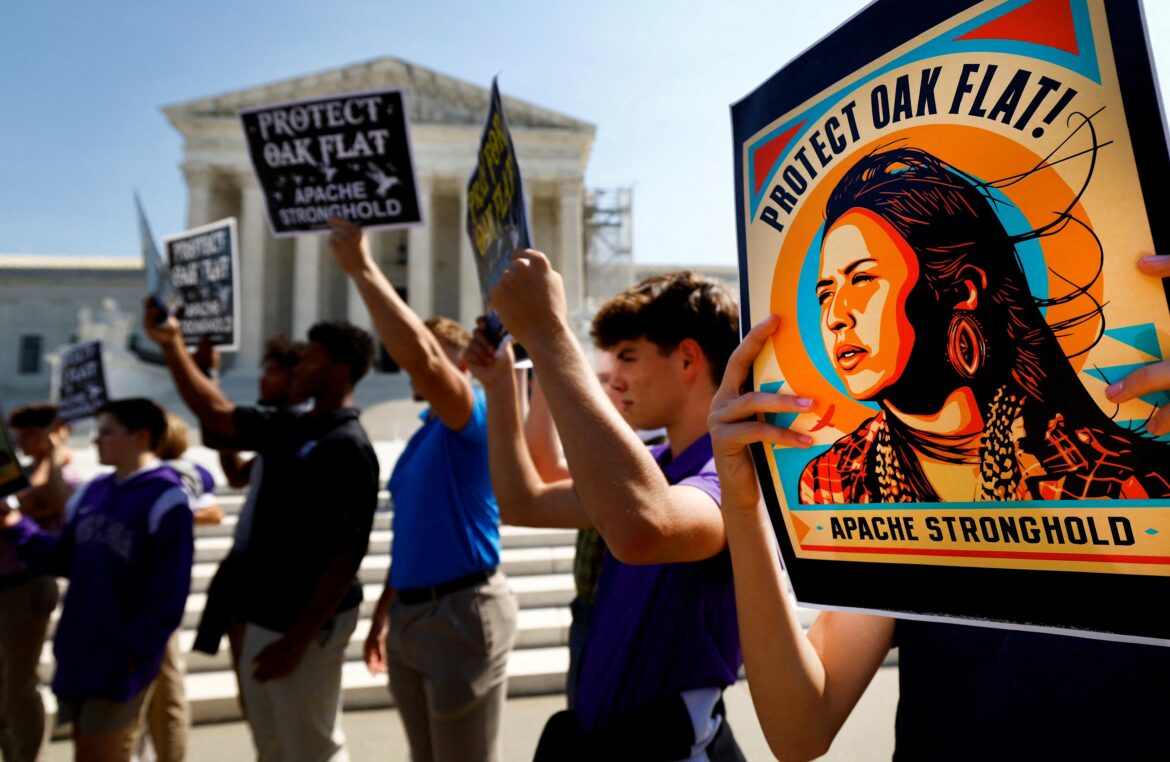WASHINGTON (OSV News) — Attorneys for a coalition of Western Apache people filed an emergency petition with a federal court April 24 after the Trump administration signaled it planned to move forward with a mining project that would destroy their sacred site, although the case’s status is still under consideration by the U.S. Supreme Court.
The coalition, which filed the petition under the banner of the nonprofit Apache Stronghold, includes other Native American and non-Indigenous supporters.
In court documents, lawyers for Apache Stronghold said they were challenging the government’s decision to transfer the site “for purposes of constructing a copper mine that will physically destroy the site — ending Apache religious rituals forever.”
Requesting Temporary Injunction
The lawyers asked for a temporary injunction prohibiting the transfer of Oak Flat to Resolution Copper until the Supreme Court responds to their pending appeal.
Oak Flat in Tonto National Forest — about 70 miles outside of Phoenix — is considered a sacred site by the region’s Indigenous peoples and is on the National Register of Historic Places.
However, after the discovery of copper deposits on the land, in December 2014, Congress authorized the U.S. Forest Service to swap the land for other sites with Resolution Copper, a foreign-owned mining company, and lifted a mining ban on Oak Flat.
An environmental impact report for the project mandated by the National Environmental Protection Act estimated that mining the site would result in a crater nearly 2 miles in diameter and about 800 to 1,000 feet deep.
‘Feds Are Barreling Ahead’
“The feds are barreling ahead to give Oak Flat to Resolution Copper, even as the Supreme Court considers whether to hear the case,” Luke Goodrich, vice president and senior counsel at Becket, a religious liberty law firm representing the plaintiffs, said in an April 25 statement. “We’re asking the courts to stop this move in its tracks and ensure justice can be delivered before Oak Flat is permanently destroyed.”
In September, Apache Stronghold asked the U.S. Supreme Court to protect their sacred site at Oak Flat, Arizona, from destruction by the mining company after a federal appeals court rejected their request.
Apache Stronghold had argued the destruction of their religious site, which cannot be replaced, would place a substantial burden on their religious practice, in violation of that law. But the appellate court ruled the Religious Freedom Restoration Act did not protect the group, as they were not being coerced by the government to violate their beliefs.
Wendsler Nosie Sr. of Apache Stronghold said in a statement, “Oak Flat is our spiritual lifeblood — the sacred place where generations of Apache have connected with our Creator.”
Asking Courts to Protect Oak Flats
“We are asking the courts to protect Oak Flat just as they have protected the sacred places of other faiths across the country,” Nosie said.
In September, a spokesperson for Resolution Copper argued in a statement provided to OSV News about Apache Stronghold’s appeal to the Supreme Court that “This case does not present any question worthy of Supreme Court review, as the Ninth Circuit simply applied well-established Supreme Court precedent.”
“This case is about the government’s right to pursue national interests with its own land — an unremarkable and longstanding proposition that the Supreme Court and other courts have consistently reaffirmed,” the statement said.
“The Resolution Copper project is vital to helping secure America’s energy future with a domestic supply of copper and other critical minerals,” it continued. “We are encouraged by the significant community support for the project, which will supply nearly one quarter of America’s copper needs, add $1 billion a year to Arizona’s economy, and create thousands of local jobs in a region where mining has played an important role for more than a century.
Dialogue With Native Americans
“Our dialogue with local Native American Tribes and communities will continue to shape the project, building on more than a decade of Tribal and government consultation and collaboration.”
A broad coalition of religious groups — Muslim, Jewish and Sikh, as well as Christian groups, including Catholic ones, filed briefs in support of the Apache group’s case. The Notre Dame Law School Religious Liberty Clinic has also supported the case.
It remains to be seen if the high court will take up the case.
Kate Scanlon is a national reporter for OSV News covering Washington. Follow her on X @kgscanlon.




